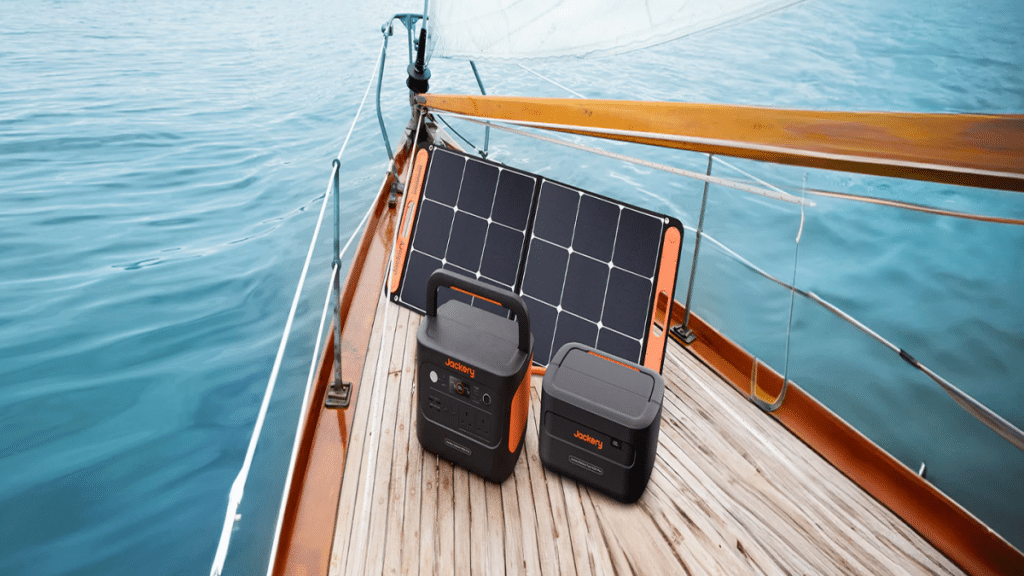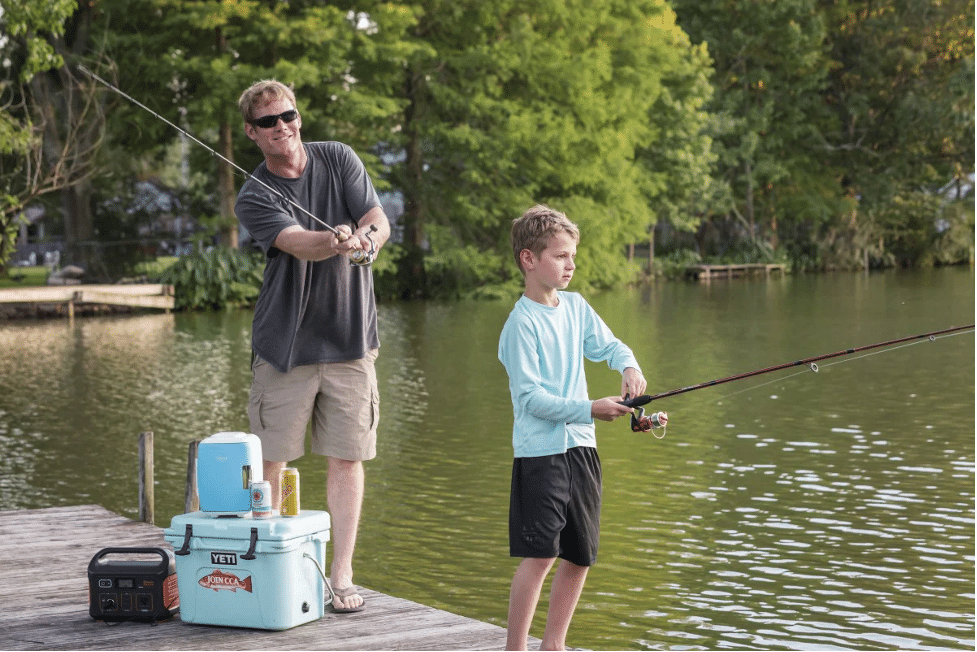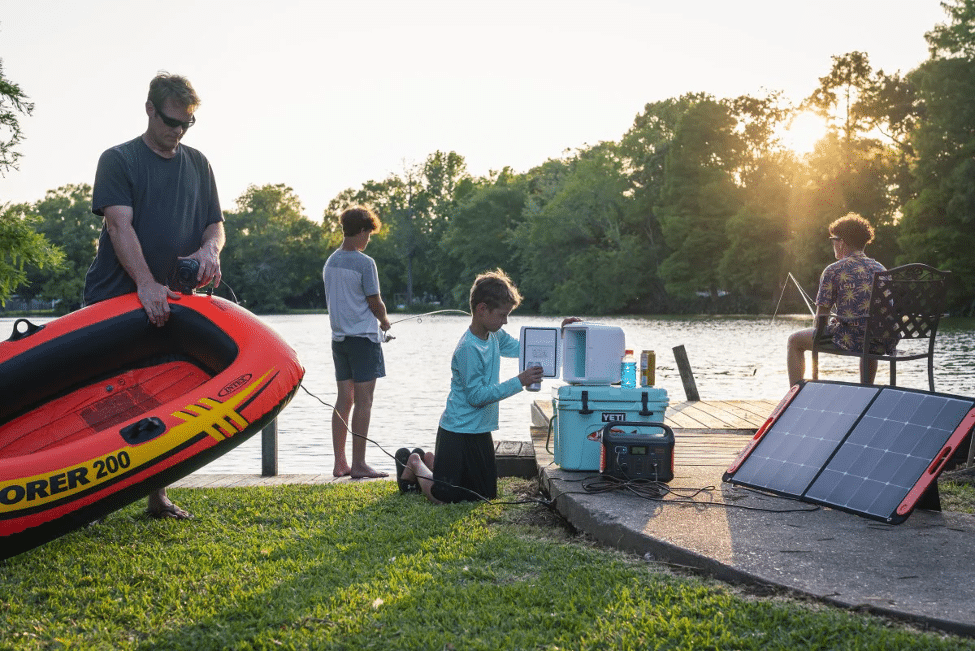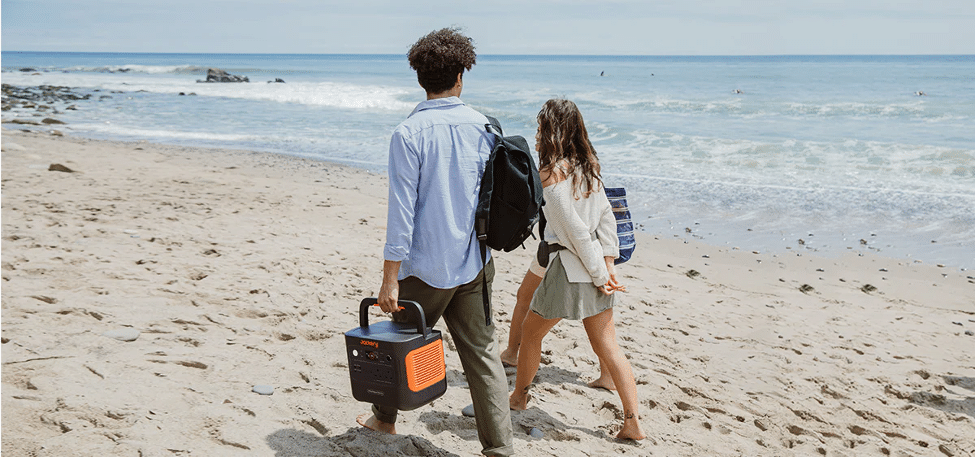A houseboat, simply put, is a boat fitted for use as a primary dwelling, typically moored to set stationary above the waters but capable of transport as well. The interior is not as cramped as you might think. They are designed to house nearly all the essentials you need for comfortable living, including a setting area, a dining area, and a full-size kitchen. They are also equipped with electrical appliances and power sources, such as a solar generator electric inverter.
Houseboat living has become an increasingly popular choice for aspiring homeowners. Being able to afford a house of your own in the UK is hard enough, so living in a houseboat may be the solution you need. Whether you are planning on buying a houseboat or renting one out, they are cheaper in every way!
Houseboats are sustainable household alternatives as they minimize your footprint and allow you to travel over water when needed. Sustainability is one of the most compelling attributes that attract homeowners these days. To adapt to sustainable living, you must also choose a sustainable energy source, such as a generator electric inverter.
Electricity Challenges for Houseboats
Our lives are heavily dependent on electronics. Everything from lighting to communication devices and kitchen appliances needs electricity to work.
This is why you must account for your electricity needs when choosing to live in a houseboat. Here are the many electricity challenges you may face:
1. Power Supply
The very first problem lies in the power supply. Houseboats are located in water, far from traditional power grids, making it difficult to directly connect to power sources. Typically, you will connect to the grid via shore power. These are hookups located at marinas and docksides that allow you to access electricity.
However, as you move from place to place, it is not easy to find these hookups. An alternative instead is to generate your electricity.
Some people opt for gasoline-powered generators that run on gas or diesel, but these are unsustainable, pose environmental concerns, and are not cost-efficient since they demand a consistent fuel supply.
A better alternative is switching to greener options such as solar power to generate electricity. What you choose to power your houseboat will depend on the power and number of appliances of your residence.
2. Electricity Storage
Generating your electricity will help reduce your reliance on the grid, but it poses concerns. If you plan on generating electricity independently, you may need an energy storage solution, as you don’t know when the weather is rainy or cloudy or when you run out of fuel. Seamlessly connecting to your backup storage device will help salvage such a circumstance.
To store all the electricity your solar panels produce, you will want to invest in a good battery system. Lithium-ion or LFP batteries are considered the go-to choice for electric systems, as they are much more energy-dense, have a longer lifespan, and demand minimal maintenance.
3. Power Distribution
The next step is power distribution. If you have a power generator and a storage device with it, how do you plan on connecting your power source to your devices?
Inverters are the middleman. Batteries typically store DC power from your generator, whereas houseboat appliances need AC power. The inverter helps convert the battery’s DC energy into usable AC electricity.
When you need to run an appliance, the electricity will move from the battery bank to your inverter, where it is converted into AC electricity and delivered via power outlets. You can then plug the device you need to power into the inverter outlets as required.
Another convenient way is to invest in a solar generator that integrates solar panels, a battery, and an inverter.
4. Electricity Safety
As you might know, water is conductive. Electricity safety is even more critical when your residence is floating over water. Thus, the power system on the houseboat also needs safety protection measures such as leakage prevention and fire prevention, as well as effective monitoring and emergency response mechanisms.
Another way to prevent accidents is to do regular checkups of your electrical installation, power points, and wiring before connecting your devices. Always look out for signs of wear and tear or damage on your equipment so you can replace them immediately.
Having a certified marine electrical engineer check your houseboat is also a good approach.
As for personal safety, never stand in water when switching on or off electrical devices to prevent shocks. Always use power cords, plugs, or extension cords that are waterproof or safe to use near water. The same applies to your power generators and inverters.
 Requirements of Houseboats for Power Supply
Requirements of Houseboats for Power Supply
Choosing a reliable power supply for your home begins with what kind of power source you need. Here are some of the essential factors you should keep in mind when making your choice:
1. Energy Self-sufficiency
The first thing to consider is energy self-sufficiency. Self-sufficient means that the power source is enough to power all your essentials without an external power supply.
A self-sufficient power source is not only reliable but can also help you save costs in the long run. But this further depends on the type of power source you rely on.
You can either choose a conventional fuel generator or a solar-powered generator. A conventional fuel generator will use gasoline or diesel to run, so it is pretty cost-intensive.
On the other hand, a solar power generator only demands upfront purchase costs and minimal maintenance costs. It uses the sun’s power to generate electricity, which is free and virtually limitless, making it a much better choice in terms of cost efficiency and self-sufficiency.
2. Environmental Friendliness
Sustainability efforts can’t be put off when choosing to reside in a houseboat. To ensure you are not potentially harming the environment, rely on eco-friendly power sources. Solar power generators again take the lead in green energy solutions.
Where fuel-based generators are noisy and release harmful gasses into the atmosphere, a solar panel inverter will operate discreetly and not release any harmful greenhouse gasses. They are highly effective in reducing greenhouse gas emissions.
3. High Efficiency
Efficient energy conversion and utilization are essential to ensure the economy, practicality, and uninterrupted power supply of the houseboat power system. Efficiency refers to how much output it can release in terms of input or the electrical power produced from the input.
In terms of efficiency, traditional oil or gas-based generators can turn around 35% to 40% of their input into electricity, with diesel generators being the more effective.[1] But this will still cause a lot of fuel waste.
On the other hand, solar panel efficiency can generally lie around 15% to 20% or even higher, depending on the manufacturers you rely on. Modern solar panels, however, can offer up to 25% efficiency, such as the Jackery solar panel, which is ideal for houseboat use without fuel waste.
4. Security
The houseboat environment poses special safety requirements for the power system, including waterproof, moisture-proof, anti-corrosion, and leakage prevention. In addition, the power system of the houseboat also needs reliable overload protection and short circuit protection functions to prevent potential risks from occurring.
5. Economy
Assess how cost-effective the power source should be in the long run rather than just look at the upfront costs.
A fuel-based generator may be cheaper upfront but will demand continuous fuel input. You must account for these fuel costs. At the same time, they carry internal combustion engines that demand higher maintenance.
Solar power generators are a better choice in this regard. Although their upfront costs may be somewhat higher, they are equally cost-effective. They do not need any additional fuel to operate. The only real costs you will have to bear are the upfront purchase costs, installation costs (if any), and minimal maintenance fees.
6. Easy to Maintain
Finally, consider the maintenance of your power supply. Where good quality output is important, you also want a power source that does not demand too much maintenance and can operate well in a humid environment.
Solar power generators are the best choice as they do not have any moving parts. The more moving parts a device has, the more maintenance it will demand, as is the case with traditional fuel-based generators. With fewer moving parts, there is a lesser chance of breakage or wear and tear, which also means longer service life.
 Choose a Generator Electric Inverter for Houseboats
Choose a Generator Electric Inverter for Houseboats
A solar generator electric inverter is a great choice for houseboats. It is cost-efficient, easy to maintain, and self-sufficient.
Now that you know what goes into choosing a reliable generator electric inverter, let’s break down the needs of your houseboat so you find the perfect fit
1. What Houseboat Appliances Can a Generator Inverter Support?
A solar generator electric inverter is the ideal choice because it can connect with nearly all your houseboat appliances. Here are some of the appliances you can connect with your generator electric inverter:
● Microwave oven
● Lighting
● Clock radio
● Computers/laptops
● Smartphones
● Small power tool
● Portable AC
● Mini refrigerators
● Water heaters
● GPS systems
● Water pumps
● Electric stoves
● Hot plates
2. What Size Generator Electric Inverter Do I Need for Houseboats?
What size generator electric inverter do you need for your houseboat? You can easily calculate by estimating the electricity needed to power your essential appliances.
Let’s do a short breakdown of how you can calculate it by using a microwave, LED lights, and mini refrigerators as a base:
The average watts consumed are as follows:
● Microwave = 600 Watts
● LED light = 30 Watts
● Mini refrigerators = 700 Watts
Therefore, the total wattage used would be 1330 Watts per day. You can then choose a generator electric inverter that can store around 1500 watts a day to keep your essentials running.
Are you looking for a high-quality generator electric inverter for your houseboat?
Top Houseboat Generator Electric Inverter Options
Choosing the right generator electric inverter depends on several factors. Therefore, making the right choice can be difficult, especially if you are new to living in a houseboat.
To enjoy the best results, you can purchase your generator electric inverter from a reputable manufacturer. We recommend exploring Jackery’s range of solar generators for your houseboat
1. Jackery Solar Generator 1000 Plus
The Jackery Solar Generator 1000 Plus is a great choice for those running a limited set of appliances. The portable generator electric inverter delivers an impressive 1260Wh capacity but can further be expanded up to 5 kW by adding on battery packs.
So, When you need to run a high-power refrigerator and heater in a hot summer or cold winter, expanding the battery capacity can meet your electricity needs without purchasing another generator.
The solar generator is built with an IP65 waterproof design and paired with monocrystalline silicon solar panels to go with it, offering a 23% solar efficiency. It is a sustainable, eco-friendly, and recyclable energy solution, delivering zero emissions, making it perfect for use in houseboats
2. Jackery Solar Generator 2000 Plus
The Jackery Solar Generator 2000 Plus is a larger-capacity choice. It’s a recommended option for those who seek a larger battery capacity.
It offers a base 2042Wh battery capacity that can be expanded up to 12 kWh. Its stunning capacity makes it capable of powering even heavy-duty devices that demand up to 3kW.
Despite its large battery capacity, it has a lightweight build, making it a fantastic portable electric generator. It has a durable LiFePO4 battery and a long 10-year lifespan. You will find this an excellent choice for use on land or in the sea!
Moreover, Jackery offers a 5-year warranty and quick response after-sales service, eliminating your worries.
 Jackery – The Reliable Green Energy Solutions Provider
Jackery – The Reliable Green Energy Solutions Provider
Founded in 2012, Jackery is one of the leading green energy solutions providers in the UK and around the globe. Even when on the move or living over the water, you deserve a reliable power source, one that is sustainable, environmentally friendly, and cost-efficient. Jackery offers a diverse range of solar-powered generators and inverters that can be used on land and water.
Browse Jackery’s website to learn more about their product lines.
References
[1] Gas CHP. Available at: https://www.ruralenergy.co.uk/gas-chp (Accessed: April 25th 2024)




